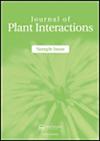一种合成的细胞分裂素在离子非依赖性盐胁迫下启动葡萄的光合和生长反应
IF 3.3
3区 生物学
Q2 PLANT SCIENCES
引用次数: 2
摘要
植物与环境的最佳相互作用有助于植物抵御包括盐胁迫在内的环境约束。本文通过对6-苯氨基嘌呤(6-Benzylaminopurine, BAP)基因(AHK4、AHP1)和盐胁迫诱导基因(CAT、APX)的表达及形态生理性状的调控,验证了在100mm NaCl环境下葡萄(Vitis vinifera)的耐盐性。一个亚组葡萄藤在盐胁迫前(48 h)用BAP (80 mg/L)进行了预处理。与未处理相比,盐胁迫处理下基因表达量分别降低了30% (CAT)和56% (APX)。盐处理没有增加叶片Na+,但降低了气孔导度(g s)、光合作用(A)、茎水势(较少负)和光系统ii效率(F v/F m),叶绿素A浓度比未处理高30%。盐的不良影响显著降低,保持较高的A/g s、F / v/F m和生长。胁迫解除后,经BAP处理的葡萄植株恢复较快。本文章由计算机程序翻译,如有差异,请以英文原文为准。
A synthetic cytokinin primes photosynthetic and growth response in grapevine under ion-independent salinity stress
ABSTRACT Aiding optimal plant–environment interaction would favor plant resilience against environmental constrains including salt stress. We test the hypothesis that 6-Benzylaminopurine (BAP) primes grapevine’s salt tolerance in vines (Vitis vinifera) received salt water (NaCl 100 mM) through the modulation of gene expression of BAP (AHK4, AHP1) and salt-stress (CAT, APX) inducible genes and morpho-physiological traits. A subgroup of vines had previously (48 h) been primed with BAP (80 mg/L) before salt stress. The gene expressions were 30% (CAT) and 56% (APX) lower in primed salt-stressed vines than that in un-primed. Salt treatment did not increase leaf Na+ but it lowered stomatal conductance (g s), photosynthesis (A), stem water potential (less negative) and photosystem-II efficiency (F v/F m). Chlorophyll-a concentrations were 30% higher in BAP-primed compared to un-primed. Adverse effects of salt were significantly reduced, maintaining high A/g s, F v/F m and growth. After the relief of the stress, the BAP primed vines had a fast recovery.
求助全文
通过发布文献求助,成功后即可免费获取论文全文。
去求助
来源期刊

Journal of Plant Interactions
PLANT SCIENCES-
CiteScore
5.30
自引率
6.20%
发文量
69
审稿时长
>12 weeks
期刊介绍:
Journal of Plant Interactions aims to represent a common platform for those scientists interested in publishing and reading research articles in the field of plant interactions and will cover most plant interactions with the surrounding environment.
 求助内容:
求助内容: 应助结果提醒方式:
应助结果提醒方式:


